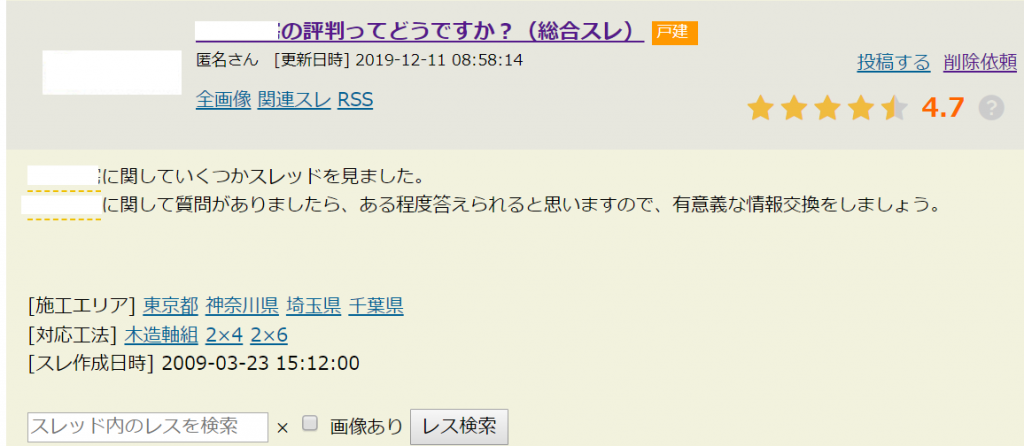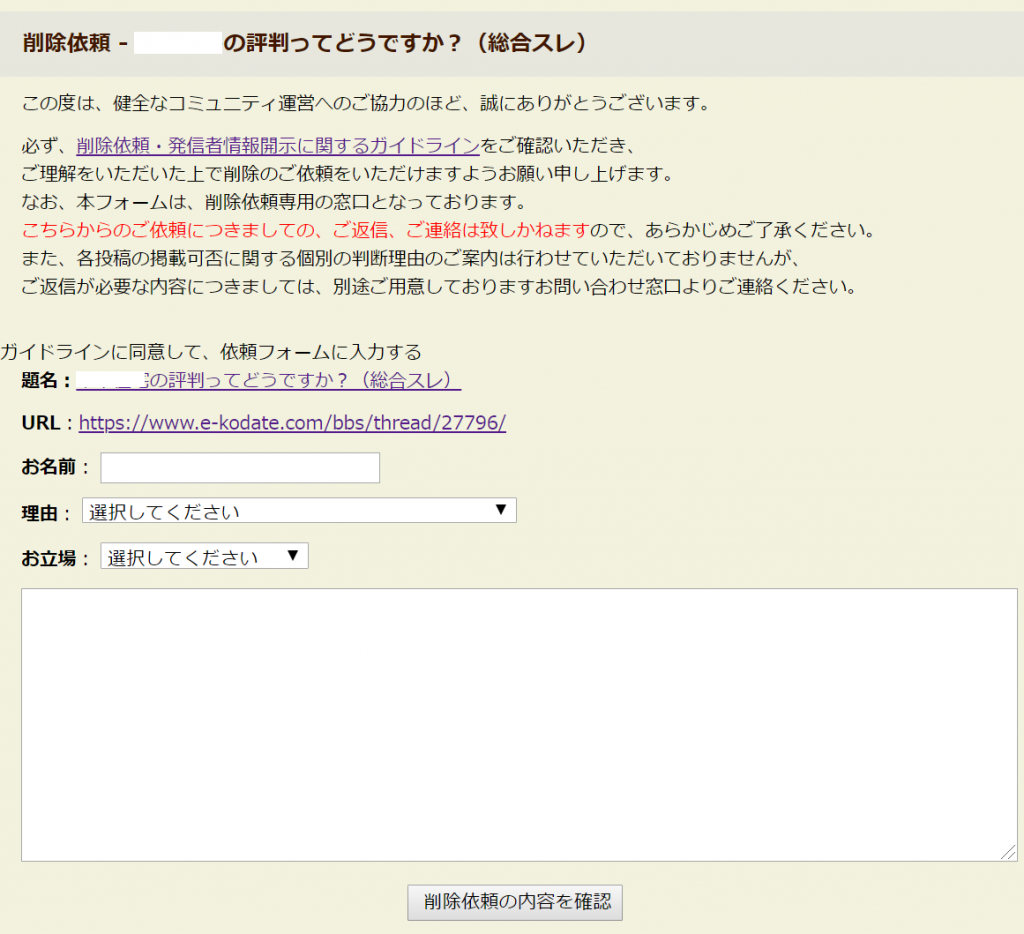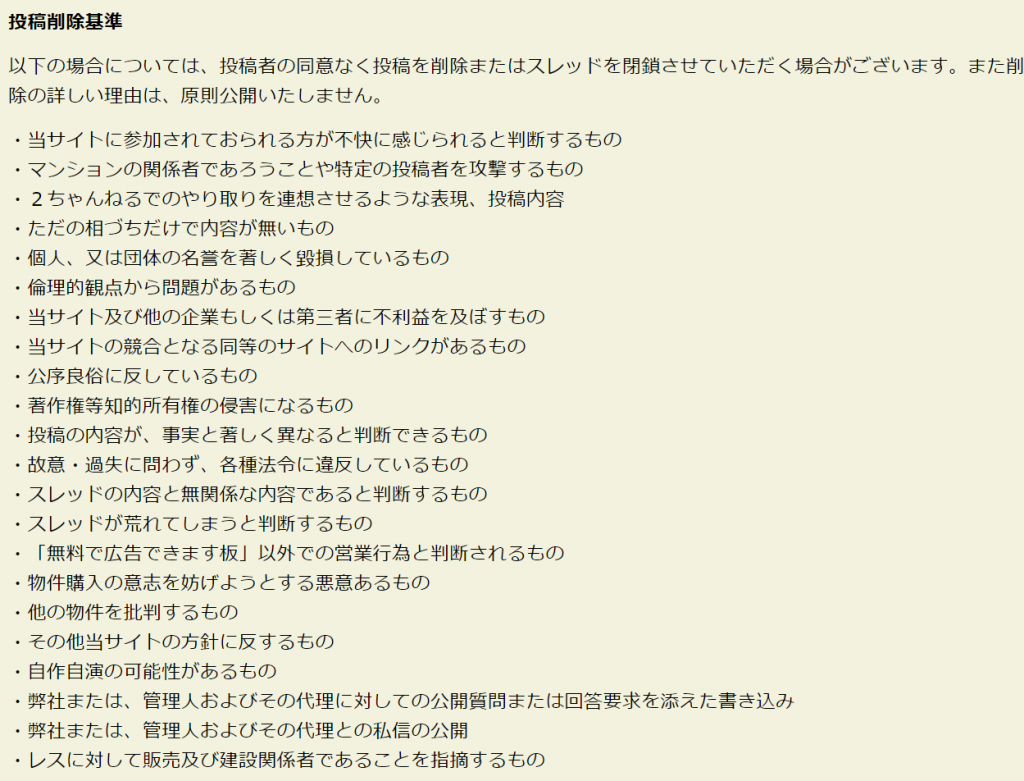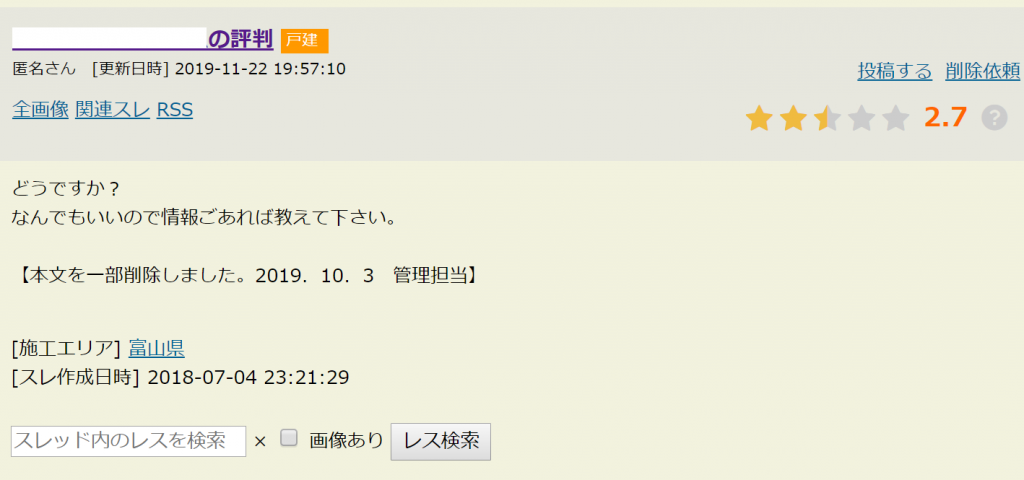What is the Method for Requesting the Removal of a Post on the e-Detached House Bulletin Board?

Despite the recent surge in popularity of condominiums, there are still many people who dream of living in a newly built detached house when they get married or have a child. Buying a detached house is a significant purchase for many, often involving a mortgage that lasts for several decades. Therefore, potential buyers tend to gather word-of-mouth information about house builders and consider their options carefully. To meet this need, there is an anonymous bulletin board called “e-Detached House”. However, not all the information posted on e-Detached House is positive. Sometimes, malicious slander is posted by competitors or others with ill intent. In this article, we will explain how to deal with slanderous posts on e-Detached House.
Explanation about e-Detached Houses
e-Detached Houses is an anonymous bulletin board site operated by Mikuru Corporation, which is touted as a “review board site to support those considering purchasing a detached house”. It primarily receives a large number of reviews about the construction quality of houses and the response of representatives from house manufacturers.
Detached houses can be broadly divided into ready-built houses and custom-built houses. Ready-built houses are those that house manufacturers design and complete themselves, and sell as a set with land. In contrast, custom-built houses are those where the house manufacturer designs and constructs the house according to the client’s wishes. Since you won’t know if you can get a house built according to your image without requesting a custom-built house, those considering it tend to be careful about gathering information to determine whether the house manufacturer is a trustworthy company. On the other hand, in the case of ready-built houses, the principle is to view the actual product after the building is completed and then purchase it, so it is less likely that there will be a discrepancy with the image. However, recently, there has been an increase in companies that offer unique after-sales services to repair defects that occur after purchase for free or at a low cost, so there is a need to gather information in advance about building quality and after-sales service response, just like with custom-built houses.
On e-Detached Houses, threads are set up for each house manufacturer for both ready-built houses and custom-built houses, and as a potential buyer, there is the advantage of being able to obtain comprehensive and abundant information. Because e-Detached Houses is a popular site among potential buyers, once a defamatory post is made, the reputational damage to the house manufacturer is immeasurable.
What Kind of Reputational Damage Exists in the e-Housing Market?

In the e-housing market, slanderous comments can be posted by competitors in the same industry. For example, there may be negative comments about the quality of a building, such as “Company A uses substandard building materials and is hiding recalls.” The quality of a building is one of the most concerning points for potential buyers, so such slander can immediately lead to a decrease in the house maker’s sales. Additionally, there may be slander from former employees who left the company with a grudge. For example, comments that damage the company’s image, such as “Company B has strict quotas and the sales team is pushy, so it’s better not to inquire,” may be posted. If such slander is posted, potential customers who were considering making an inquiry may feel anxious about being forced into a contract and decide not to inquire. As a result, the house maker may suffer damage by losing valuable potential customers.
How to Request Removal for Violation of Terms of Use
If defamatory comments are posted on e-Kodate, you can request their removal through the deletion request form located in each thread. To display the deletion request form, click the “Request Deletion” button found in each thread or comment.


The deletion request form that appears is as follows:

In the deletion request form, enter ① your name, ② the reason for the deletion request, ③ your position, and ④ the details of the deletion request, and then submit the form. For ② the reason for the deletion request and ③ your position, select the closest option from the dropdown menu. The most important part of the deletion request is ④ the details of the deletion request. This field is free-form, so you need to fill in the response number of the post you want to delete without omission, and then specifically explain how that post violates the post deletion criteria in the terms of use. The terms of use of e-Kodate are the same as those of the anonymous bulletin board “Mansion Community” operated by the same company. The terms of use stipulate that the operator will delete posts that meet the following post deletion criteria.

If your deletion request for e-Kodate is accepted, the deleted post will be displayed as follows:

e-Kodate tends to respond quickly, and problematic posts are usually deleted within about a week of the deletion request. Therefore, if the post in question is not deleted after about a week to 10 days, it can be assumed that the deletion was not accepted.
When Defamatory Comments About Building Quality Are Posted
If defamatory comments about building quality, such as “Company A uses inferior building materials and is hiding recalls,” are completely unfounded, they could be considered defamation. However, it’s important to note that simply claiming defamation when directly requesting the operator to delete a post based on a violation of the terms of use may not be readily accepted. This is because, for defamation to be established, the content written must be different from the truth, but the operator does not have the means to investigate the facts about whether Company A is hiding recalls.
Therefore, when defamatory comments about construction quality are posted, it is possible to argue that they fall under “those that disadvantage this site and other companies or third parties” in the post deletion criteria. The content stating that a company is hiding recalls of building materials is extremely serious, so whether it’s true or not, the mere fact that such a reputation is established can be said to cause significant disadvantage to Company A.
When Defamatory Comments That Damage a Company’s Image Are Posted
For defamatory comments that damage a company’s image, such as “Company B has strict quotas and the salespeople are persistent, so it’s better not to inquire,” it is possible to argue that they fall under “malicious ones that aim to hinder the intention to purchase a property” in the post deletion criteria. Generally, there is a strong image that once you inquire about real estate sales, you will be contacted many times and it will be troublesome to deal with. Therefore, if there are rumors that the salespeople are persistent, many people are likely to hesitate to inquire. If so, the defamatory comment “It’s better not to inquire because the salespeople are persistent” can be said to be a malicious post that aims to prevent the purchase of a property from that house maker.
Examples of Cases Where Removal Requests are Made on the Grounds of Illegality

A typical case where a defamatory post becomes illegal is defamation. Defamation is generally established when a fact that lowers a person’s social reputation is posted. However, defamation does not occur if the posted fact is true or if there is a legitimate reason or basis to believe it is true. We provide a detailed explanation of the requirements for defamation in the article below.
https://monolith.law/reputation/defamation[ja]
The defamatory statement mentioned above, “The building materials used by Company A are of poor quality and they are hiding a recall,” could potentially constitute a legal violation by Company A depending on the circumstances. Therefore, it can be said to be a fact that lowers the social reputation of Company A, and there is a possibility of defamation. In cases where defamation is illegal, not only can a removal request be made from the removal request form, but a request for transmission prevention measures can also be made to the site administrator or hosting provider based on the Japanese Provider Liability Limitation Law. Transmission prevention measures have the same effect as removal. However, whether to take transmission prevention measures is left to the discretion of the site administrator who received the request, so it can often be said that the result does not change significantly compared to when a removal is requested directly from the site’s removal request form.
Deletion by Provisional Disposition
As we have seen, directly requesting the operator to delete content can lead to a quick resolution. However, whether the content is deleted or not depends on the operator’s judgment. In such cases, one method to enforce deletion is to use the procedure of provisional disposition through the courts. A provisional disposition is a temporary procedure different from a formal court procedure, and usually concludes relatively quickly, within about 1 to 2 months. For more detailed explanation about provisional dispositions seeking post deletion, please refer to the article below.
https://monolith.law/reputation/provisional-disposition[ja]
Identifying Posters through Provisional Dispositions
Not only can defamatory posts be removed, but the poster can also be identified through a request for disclosure of sender information. For example, if you want to claim damages (compensation) for reputational harm from the poster, or if you want to obtain a pledge from them not to repeat the same actions, or if you want to file a criminal complaint in severe cases, it is necessary to identify the poster. We provide a detailed explanation about requests for disclosure of sender information in the article below.
https://monolith.law/reputation/disclosure-of-the-senders-information[ja]
In a request for disclosure of sender information, you can identify the Internet Service Provider (ISP) that the poster is contracted with from their IP address, and receive disclosure of the poster’s personal information from that provider. However, as personal information is highly confidential, it is generally the case that providers will not comply with the disclosure of sender information unless a provisional disposition procedure is used. Therefore, if you want to not only remove the post but also identify the poster, it is advisable to use the provisional disposition procedure from the start.
Summary
Given the high number of potential buyers viewing e-houses, any malicious slander posted can cause significant reputational damage to house manufacturers. Particularly in the case of ready-built homes, where the business model typically relies on completing the process from completion to sale in a short period of time, it is necessary to respond promptly to minimize damage if slanderous comments are posted. Procedures such as requesting the removal of posts through provisional dispositions or identifying the poster through a request for disclosure of sender information require going through the courts, making it difficult to handle without the assistance of a lawyer. Furthermore, dealing with online slander and reputational damage requires specialized knowledge in IT, making it crucial to consult with a lawyer experienced in this field.
Category: Internet





















